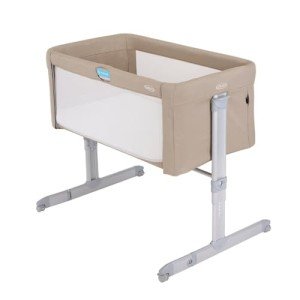5 Clarifications On Bedside Cot For Baby's Room
The Ultimate Guide to Choosing a Bedside Cot for Your Baby's Room
As new parents prepare to invite their little ones, one of the most pressing issues is creating a safe and comfortable sleeping environment. A bedside cot is a progressively popular option, supplying benefit and comfort. This short article checks out the advantages of bedside cots, crucial features to consider, their benefits over conventional cots, and responses to regularly asked concerns.
What is a Bedside Cot?
A bedside cot, also understood as a co-sleeper or side-sleeper cot, is developed to connect safely to the side of the moms and dad's bed. This innovative sleeping service enables for easy availability, making it possible for parents to tend to their baby's requirements without the need to leave their own sleeping space. This convenience fosters a bonding experience, as parents can easily reach their baby for feedings and convenience throughout the night.
Benefits of Using a Bedside Cot
Bedside cots use many advantages that traditional cribs might not provide. Here are some essential advantages:
- Convenience: Bedside cots allow parents to be near their baby without jeopardizing space or safety.
- Safety: Many bedside cots fulfill security requirements and design functions to guarantee the baby can not roll out onto the flooring.
- Breastfeeding Friendly: Mothers can easily breastfeed during the night without requiring to rise.
- Easier Sleep Training: Bedside cots can make sleep training easier as babies feel safe and secure being close to their parents.
Secret Features to Consider When Choosing a Bedside Cot
When selecting the ideal bedside cot for your baby's room, bear in mind the following vital features:
1. Safety Standards
- Make sure the cot meets regional security guidelines and standards. Look for a cot that has breathable mesh sides for better ventilation.
2. Height Adjustment
- Try to find a cot with adjustable heights to match your bed's level, enabling a secure fit and lessening the danger of gaps.
3. Stability
- Ensure the cot has a strong frame to avoid tipping. Stability is important for security.
4. Mobility
- If travel is anticipated, consider a light-weight design that can quickly fold or disassemble.
5. Convertible Features
- Some cots can convert to a bassinet or playpen, enabling extended use beyond infancy.
6. Mattress Quality
- Examine for a firm, appropriately fitted mattress that meets safety requirements to support the infant's fragile body.
7. Ease of Assembly
- A cot that is easy to put together and take apart can save time and disappointment, particularly for new parents.
8. Cost Range
- Budgets can vary; figure out in advance just how much you want to spend on a bedside cot.
Contrasts: Bedside Cot vs. Traditional Cot
Function
Bedside Cot
Standard Cot
Accessibility
Easy access from bed
Requires complete motion to reach baby
Co-sleeping Functionality
Developed for co-sleeping
Not ideal for co-sleeping
Size
Usually smaller for space performance
Standard crib size
Mobility
Often more portable
Much heavier and less portable
Connection with Parent
Straight connected to the parent's bed
Freestanding, needing distance
Flexibility
Can convert and adjust to various stages
Primarily for setting infant down
Frequently Asked Questions (FAQs)
1. Are bedside cots safe for newborns?
Yes, if effectively established according to safety guidelines and attached firmly to the parent's bed, bedside cots are safe for newborns.
2. Can a bedside cot avoid SIDS (Sudden Infant Death Syndrome)?
While no cot can ensure prevention of SIDS, using a bedside cot motivates safe sleep practices, permitting parents to monitor their baby closely.
3. For how long can a baby use a bedside cot?
Typically, babies can use a bedside cot from birth approximately around six months old, depending on the particular weight and height limits set by the producer.
4. Do Side Sleeping Crib include a bed mattress?
A lot of bedside cots consist of a bed mattress; however, it's important to inspect that it complies with security standards and fits well within the cot to avoid gaps.
5. Can you use a bedside cot with a bed that has a high frame?
Yes, lots of bedside cots include adjustable heights to accommodate different bed heights. Always measure the bed height to guarantee a correct fit.
6. What is the very best product for a bedside cot?
Search for natural products such as solid wood or organic materials that are totally free from poisonous chemicals, making sure a safe environment for your baby.
A bedside cot can substantially improve the experience of new parents, providing the accessibility and security required during the newborn phase. With careful factor to consider of the features laid out above, parents can pick a bedside cot that finest suits their family's requirements. By purchasing a quality bedside cot, parents can delight in more peaceful nights, knowing their baby is nearby, protect, and comfortable.
Secret Takeaways
- Bedside cots offer benefit, security, and convenience for both moms and dad and baby.
- Important functions to think about include safety requirements, stability, and size.
- Always ensure you select a cot that satisfies security regulations and fits your lifestyle.
Developing a supporting environment for a baby does not end with the cot option but starts there, offering comfort and security for a peaceful night's sleep.
